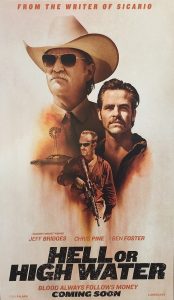
“Hell or High Water” reminded me so much of “Killing Them Softly” that I was surprised to discover it wasn’t based on a novel by George V. Higgins, nor was it the work of writer/director Andrew Dominik. The screenplay is credited to Taylor Sheridan, who made a splash with his sharp “Sicario” script, and the film is directed by David Mackenzie, whose “Starred Up” caught some buzz a few years ago. The more I reflect on their film, the more I’m not surprised it isn’t the work of Dominik. It may share the same DNA, and suffer from the same on-the-nose dialogue, but it’s much more intimate and tightly wound.
The DNA referenced would be the not-so-subtle social commentary on politics, moreso the corporate greed and corruption that strangles the poor. The banks are the main target this time around, with a pair of brothers, Toby & Tanner Howard (Chris Pine & Ben Foster), robbing their drawers blind to pay off their family farm and get out of debt. (Wanna take a guess who put them in debt?) The local police hot on their tail aren’t too concerned over the bank’s woes, nor are the townsfolk who are simply happy to see them get their just desserts. Even those in the finance industry are self-loathing, spitting venom in the direction toward banks who utilize reverse mortgages to trap the poor and eventually buy out their land from under them. One would have to be as blind as Stephen Lang in “Don’t Breathe” to not realize the message here (fitting considering that character’s motivation).
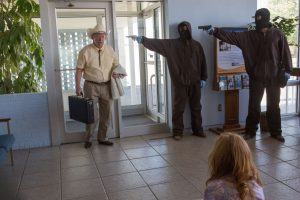
Toby & Tanner aren’t the smartest of bank robbers. They arrive too early, before the manager even arrives to unlock the safe, making them play the waiting game with a mouthy hostage who calls them stupid repeatedly. The younger brother, Toby, leaves the gun of a civilian on the counter, allowing him the opportunity to shoot at them as they make their escape. Toby has a good excuse: he’s a novice who’s only robbing banks for the greater good. His older brother, a seasoned criminal, has no excuse for his shortcomings, just the explanation that his short temper gets the better of him. At one point he robs a bank not on their route while his unbeknownst brother flirts with a waitress at the adjacent diner, nearly getting them caught in the process. Good thing for them the denizens of the sleepy Texas town would rather watch the banks bleed dry before turning over a thief.
Where the two are smart is in covering their tracks. They plan on robbing two banks every morning, before they get crowded to avoid casualties, with a handful of vehicles at their disposal. When the morning comes to a wrap, they bury the getaway car under their farm. As for paying off the reverse mortgage and Toby’s child support, they cash in at a casino, pretend to gamble, then cash out their “earnings” in the form of a check. All the work of the smarter brother, Toby, no doubt.
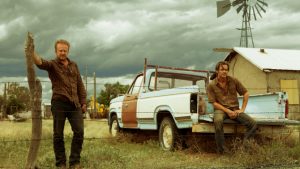
Tracking them down is Marcus Hamilton (Jeff Bridges), the requisite sheriff just days away from retirement. The difference here is he’d rather not retire, salivating at the opportunity to play cat and mouse. It’s his tired partner, Alberto Parker (Gil Birmingham), who’s counting the days until his retirement so he doesn’t have to deal with his snark anymore. The two travel the empty back roads of Texas and Oklahoma at Marcus’ behest, bickering like an old married couple.
There’s an undercurrent of racial tension in Sheridan’s script, one that could be mistaken as poorly thought out when used as comic relief. Instead of acting as commentary, he wisely uses it as an examination on culture. It would be a lie to pretend that a sheriff such as Hamilton wouldn’t crack wise at Alberto’s heritage (half Indian, half Mexican), just as it would be ignorant to not realize he dishes it out in jest. Any other comic relief in this format, such as a civilian’s racist remark to a bank robbery, elicits a laugh out of its uncomfortable honesty. I laughed at the asinine xenophobia, not with it.
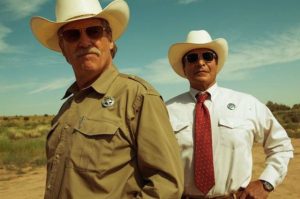
Another facet of the film that comes across as an examination more than commentary is in gun control. The towns visited in this film are replete with townsfolk all brandishing a gun. While this comes into play in the form of vigilante groups and their involvement in the finale, it never feels as if it’s acting as a commentary on gun rights. It exists because this would exist in this area of the country. If there were underlying themes here I missed them, most likely due to them not being as overt as the class warfare commentary.
It’s a funny thing that these elements of the script come off as more subtle than the actual theme. For as good as Sheridan is in writing dialogue, he overindulges at times, relying on exposition to spell out each character’s drive. The humor is too cheeky at times, with certain sequences existing solely for characters to play off of. Take for instance the restaraunt that only serves steak. The restaraunt exists as the sheriffs’ stakeout, but the witchy waitress who barks at her customers only exists to produce a laugh and bewilderment. It’s funny for sure, but arguably pointless (just like some of the comedic beats in Quentin Tarantino’s “Django Unchained”).
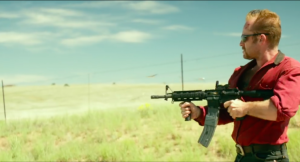
Even when the film is beating the audience over the head with its message, it never feels too forced. It’s too engaging and brutally honest to ever lose interest. Mackenzie brings Dominik’s script to life with quiet energy, directing his cast to tremendous heights. Bridges is in fine form as the sardonic sherriff, getting the film’s biggest and most deserved laughs out of mere observations (the best one coming from his description of a bank manager). Birmingham plays off of him well with the two developing a warm bond. Ben Foster avoids going over the top, injecting his Tanner with enough indignation to keep him grounded. Chris Pine gives his best performance to date as the quiet and sympathetic Toby, proving both his screen presence and awareness. There are two scenes in particular that highlight the latter. The first is his fear and inner turmoil while passing through a police stop. The second is his showdown with Hamilton. Pay close attention to his eyes in both scenes which tell his story better than any dialogue could.
I may have been reminded of “Killing Them Softly” during my viewing of “Hell or High Water,” but don’t let that fool you. It’s a vastly superior film, both in writing and direction!
Final Rating: B+
